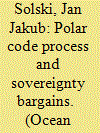|
|
|
Sort Order |
|
|
|
Items / Page
|
|
|
|
|
|
|
| Srl | Item |
| 1 |
ID:
190651


|
|
|
|
|
| Summary/Abstract |
Abandonment is a significant challenge that seafarers face today. The number of seafarer abandonment instances has increased between 2020 and 2021, and dealing with this issue has become a major concern for policymakers. In 2021, in total, 1,399 seafarers on 94 vessels were abandoned. The 2006 Maritime Labour Convention (MLC) was amended in 2014 to include provisions for protecting abandoned seafarers. Newly inserted provisions established a financial security system for assisting seafarers in a seafarer abandonment situation. Although today the MLC incorporates this mechanism to protect abandoned seafarers, the issue of abandonment of seafarers continues to persist, and the time consumed in resolving these cases is sometimes very long. This article assesses the effectiveness of the financial security system under the MLC in granting protection to abandoned seafarers. It highlights the current regime's flaws and how the regime can be improved.
|
|
|
|
|
|
|
|
|
|
|
|
|
|
|
|
| 2 |
ID:
190650


|
|
|
|
|
| Summary/Abstract |
The recent maiden voyage of the Yara Birkeland witnessed yet another development in autonomy that is transforming the maritime sector. Marine autonomous surface ships (MASS) are claimed to bring many opportunities to society at large, not least in terms of operational efficiency and safety of the crew, fewer emissions, and greener shipping. On the assumption that MASS will prove safe enough to ply our seas and oceans, this article investigates the flexibility and ability of the existing International Maritime Organization (IMO) regulations on ships’ routing, ship reporting, and vessel traffic service (VTS) to respond to the technological developments, allowing for the operation of both remotely controlled ships without seafarers on board and fully autonomous ships. It argues that the regulations in question are largely supportive of autonomy. Challenges, however, exist when it comes to the employment of fully autonomous ships and the effective use of VTS.
|
|
|
|
|
|
|
|
|
|
|
|
|
|
|
|
| 3 |
ID:
190652


|
|
|
|
|
| Summary/Abstract |
Ecosystem-based approaches to marine management, which integrate marine law and policy across sectors, communities, and scales, are increasingly advocated for in international policy debates and scholarly literature. We highlight critical and timely opportunities in Aotearoa New Zealand’s evolving legal context to support an ecosystem-based approach across fisheries regulation, biodiversity conservation, environmental effects management, and Indigenous or customary rights. Given the scale of proposed law reform affecting the ocean in Aotearoa New Zealand, there are important global lessons to be elucidated from (and for) the Aotearoa New Zealand experience, revealing the potential for law to center the health of ocean ecosystems and related people in integrated marine decision making.
|
|
|
|
|
|
|
|
|
|
|
|
|
|
|
|
| 4 |
ID:
190649


|
|
|
|
|
| Summary/Abstract |
Although exclusive common pool resource management regimes have locally been applied since time immemorial in many coastal and fjord areas, in the legal conceptualization of space, the oceans and their living resources were traditionally treated as a “global commons.” The idea of restricting access to coastal oceanic resources and delegating their governance to state instruments has become increasingly popular since the middle of the previous century when political economy models predicted the eventual overexploitation or degradation of all resources used in common. While state jurisdictions overall continue to preserve the idea of common access to marine living resources for a state’s people, the rapid privatization of marine living resources and the subsequent development of aquaculture over the last few decades, often confront this understanding, leading to enclosure of a delineated maritime area that was initially intended to be accessible to the public. Enclosing the sea for the purpose of aquaculture development leads to a semantic change in property institutions that govern coastal areas and provides for a form of enclosure of the commons in key locations designated for marine aquaculture development. This article explores the concept of “ocean commons” and debates how the enclosure of common areas for the purposes of aquaculture development may collide with Indigenous and local conceptions of common pool resource management. The article applies this theoretical investigation on two examples from Canada and Norway, and suggests that rethinking aquaculture development in coastal waters through the lens of “ocean commons” may provide a guiding ethos for revisiting current approaches of access to the sea and ensuring the harmonious coexistence between aquaculture development and local/Indigenous traditional activities.
|
|
|
|
|
|
|
|
|
|
|
|
|
|
|
|
| 5 |
ID:
190648


|
|
|
|
|
| Summary/Abstract |
Owing to a shift from the culture of compliance to the culture of benchmarking, the Polar Code process of ensuring safe operation and environmental protection in Polar waters is still ongoing. The risk and goal-based approaches embedded in significant parts of the Polar Code invite different stakeholders to participate in the development of Arctic shipping governance. The methodology used in the process, such as POLARIS, may serve as a common baseline, but its utility relies on further updates and validation. The reliability of decision-support systems depends largely on whether different stakeholders embrace the system and share their experiences to facilitate systematic updates. This article compares the approaches of the two major coastal states, Canada and Russia, to POLARIS as reflected in their coastal state systems of shipping control in the Canadian Arctic Waters and the Russian Northern Sea Route (NSR). Considering that much Arctic shipping occurs within the Canadian Arctic and the NSR, their regulatory approaches may affect POLARIS’s popularity, acceptance, and, eventually, success in providing a common regulatory baseline.
|
|
|
|
|
|
|
|
|
|
|
|
|
|
|
|
|
|
|
|
|